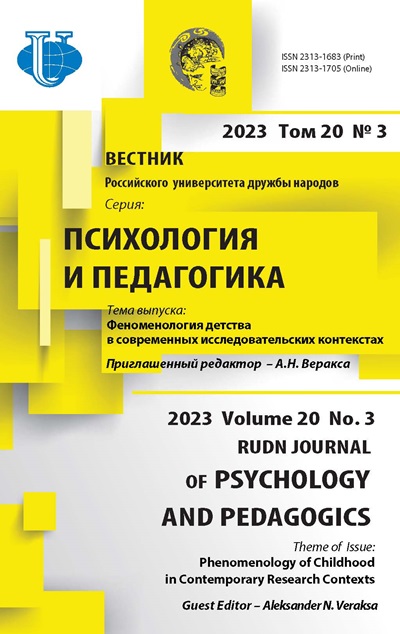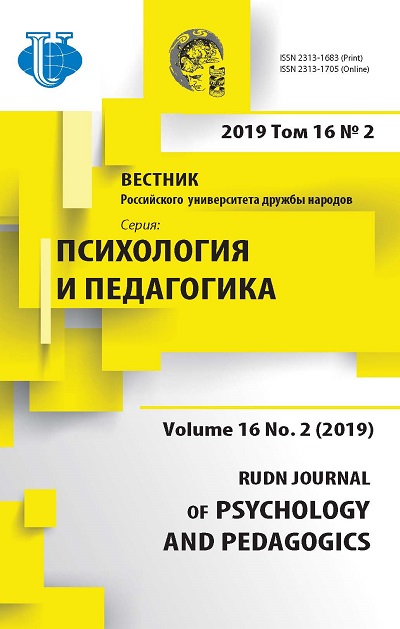Psychosocial Status of Patients with Chronic Heart Failure Awaiting Heart Transplantation
- Authors: Shindrikov R.Y.1,2, Shchelkova O.Y.2,3, Demchenko E.A.4, Sitnikova M.Y.4
-
Affiliations:
- Pavlov First Saint Petersburg State Medical University
- Saint Petersburg State University
- Bekhterev National Medical Research Centre of Psychiatry and Neurology
- Almazov National Medical Research Centre
- Issue: Vol 16, No 2 (2019)
- Pages: 163-180
- Section: PERSONALITY AND CLINICAL PSYCHOLOGY
- URL: https://journals.rudn.ru/psychology-pedagogics/article/view/21372
- DOI: https://doi.org/10.22363/2313-1683-2019-16-2-163-180
Cite item
Full Text
Abstract
A pilot study of psychosocial status of 80 patients (85% males) with terminal chronic heart failure (CHF), during the preparation for heart transplantation (HT) has been carried out in the Almazov National Medical Research Centre. The correlation of psychological, medical, biological and socio-demographic characteristics of patients as well as the dynamics of patients’ emotional state (anxiety and depression) during a long cardiology hospital stay (4 measurements over half a year) has been studied. The authors’ structured interview and a set of psychodiagnostic methods (“Index of General Well-being”, “Brief neuropsychological examination of cognitive sphere”, depression scale (SDS), scale of anxiety (STAI), personality questionnaire BIG-V) have been used in the study. For mathematical and statistical data processing the following methods included in the software package SPSS v. 20.0 have been used: the Pearson’s chi-squared test (χ2), the Mann - Whitney U test, the Spearman and Pearson correlations, and ANOVA. The results revealed the absence of clinically significant signs of depression, cognitive impairment, personality and system of significant relationships in the majority of patients at the first stage of the study (upon admission into hospital). The exception was the increased level of situational anxiety (M ± m = 43.2 ± 7.1). The study of the dynamics of the emotional state of patients reflected a systematic increase in the average group indices of the depression scale (upon admission M ± m = 46.9 ± 6.7; after 2 months M ± m = 48.9 ± 7.4; after 4 months M ± m = 51.1 ± 7.6; after 6 months M ± m = = 52.6 ± 7.5), as well as a decrease in the level of situational anxiety at the second stage of the study compared with the first and a further increase starting from the second period: after 2, 4, 6 months of the stay in hospital, respectively: M ± m = 41.3 ± 5.2; M ± m = 46.7 ± 6.8; M ± m = 50.8 ± 7.9). It was revealed that the level of situational anxiety at the second (F = 6.18; p < 0.05) and the third (F = 4.11; p < 0.05) stages of treatment is significantly higher in the patients after myocardial infarction(s). Also, the level of situational anxiety is higher at the first (F = 4.00; p < 0.05) and third (F = 3.68; p < 0.05) stages of hospitalization of the patients who have rare meetings with relatives as compared to the patients who are often visited by their relatives. The results reflect the psychosocial potential of patients waiting for HT, and may have a prognostic significance in relation to adherence to treatment in the postoperative period, which, in turn, largely determines the survival of patients.
About the authors
Roman Yu. Shindrikov
Pavlov First Saint Petersburg State Medical University; Saint Petersburg State University
Author for correspondence.
Email: shindrikov@list.ru
Assistant at the Department of General and Clinical Psychology, Pavlov First Saint Petersburg State Medical University
6-8 Lva Tolstogo St., Saint Petersburg, 197022, Russian Federation; 7-9 Universitetskaya Emb., Saint Petersburg, 199034, Russian FederationOlga Yu. Shchelkova
Saint Petersburg State University; Bekhterev National Medical Research Centre of Psychiatry and Neurology
Email: Olga.psy.pu@mail.ru
Doctor Sc. of Psychology, is Full Professor, Professor and Chief of the Department of Medical Psychology and Psychophysiology, Saint Petersburg State University; and Senior Research Fellow at Bekhterev National Medical Research Centre of Psychiatry and Neurology
7-9 Universitetskaya Emb., Saint Petersburg, 199034, Russian Federation; 3 Bekhterev St., Saint Petersburg, 192019, Russian FederationElena A. Demchenko
Almazov National Medical Research Centre
Email: elenademchenko2006@rambler.ru
Doctor Sc. of Medicine, is Head of Research Laboratory for Rehabilitation at Almazov National Medical Research
2 Akkuratova St., Saint Petersburg, 197341, Russian FederationMariya Yu. Sitnikova
Almazov National Medical Research Centre
Email: drsitnikova@mail.ru
Doctor Sc. of Medicine, is Head of Research Department for Heart Failure at Almazov National Medical Research Centre
2 Akkuratova St., Saint Petersburg, 197341, Russian FederationReferences
- Alhurani, A.S., Dekker, R., Ahmad, M., Miller, J., Yousef, K.M., Abdulqader, B., & Moser, D.K. (2018). Stress, cognitive appraisal, coping, and event free survival in patients with heart failure. Heart & Lung, 47(3), 205—210. https://doi.org/10.1016/j.hrtlng.2018.03.008
- Baird, D., Jackson, A.C., Higgins, R.O., Murphy, B.M., & Tully, P.J. (2018). Screening, assessment and treatment for depression in patients with chronic heart failure. British Journal of Cardiac Nursing, 13(8), 386—393. https://doi.org/10.12968/bjca.2018.13.8.386
- Doehner, W., Ural, D., Haeusler, K.G., Čelutkienė, J., Bestetti, R., Cavusoglu, Y., & Alvear, R.M. (2018). Heart and brain interaction in patients with heart failure: overview and proposal for a taxonomy. A position paper from the Study Group on Heart and Brain Interaction of the Heart Failure Association. European Journal of Heart Failure, 20(2), 199—215. https://doi.org/10.1002/ ejhf.1100
- Dracup, K., Walden, J.A., Stevenson, L.W., & Brecht, M.L. (1992). Quality of life in patients with advanced heart failure. The Journal of Heart and Lung Transplantation: The Official Publication of the International Society for Heart Transplantation, 11(2 Pt 1), 273—279.
- Drobizhev, M.Yu., Begrambekova, Yu.L., Mareev, V.Yu., & Kikta, S.V. (2016). Effect of depression and anxiety on clinical outcomes in patients with CHF. Heart Failure, 17(2), 91—98. (In Russ.)
- Hanin, Yu.L. (1976). A Brief Guide to The Use of the Scale of Reactive and Personal Anxiety by Spielberger.Leningrad. (In Russ.)
- Iakovleva, M.V. (2016). Features of the personality and the attitude towards the disease of adherent and non-adherent to treatment patients during the recovery period after coronary bypass surgery. Herald of Psychotherapy, 57(62), 49–58. (In Russ.)
- Juenger, J., Schellberg, D., Kraemer, S., Haunstetter, A., Zugck, C., Herzog, W., & Haass, M. (2002). Health related quality of life in patients with congestive heart failure: comparison with other chronic diseases and relation to functional variables. Heart, 87(3), 235—241. https://doi.org/10.1136/ heart.87.3.235
- Kessing D., Denollet J., Widdershoven J., & Kupper N. (2016). Psychological determinants of heart failure self-care: systematic review and meta-analysis. Psychosom. Med., 78(4), 412—431.
- Klein, D.M., Turvey, C.L., & Pies, C.J. (2007). Relationship of coping styles with quality of life and depressive symptoms in older heart failure patients. Journal of Aging and Health, 19(1), 22. https:// doi.org/10.1177/0898264306296398
- Lubinskaya, E.I., Nikolaev, O.B., & Demchenko, E.A. (2012). Comparison of the clinical and social effectiveness of cardiac rehabilitation of patients undergoing coronary artery bypass surgery. Bulletin of the Russian Military Medical Academy, (1), 218—223. (In Russ.)
- Müller-Tasch, T., Löwe, B., Lossnitzer, N., Frankenstein, L., Täger, T., Haass, M., & Herzog, W. (2017). Anxiety and self-care behaviour in patients with chronic systolic heart failure: a multivariate model. European Journal of Cardiovascular Nursing, 17(2), 170—177. https://doi. org/10.1177/1474515117722255
- Pervin, L., & John, O. (2001). Psychology of Personality: Theory and Research. Moscow: Aspect-Press Publ. (In Russ.)
- Rybakova, T.G., & Balashov, T.N. (1988). Clinical and Psychological Characteristics and Diagnosis of Affective Disorders in Alcoholism: Manual. Leningrad: V.M. Bekhtereva NIPNI Publ. (In Russ.)
- Schelkova, O.Yu., Eremina, D.A., Yakovleva, M.V., Shindrikov, R.Yu., & Kruglova, N.E. (2018). Methodology of developing a systemic model of prognosis in cardiovascular diseases. Bulletin of Saint Petersburg University. Psychology and Pedagogy, 8(3), 271—292. https://doi.org/10.21638/11701/ spbu16.2018.305 (In Russ.)
- Schiffer, A.A., Denollet, J., Widdershoven, J.W., Hendriks, E.H., & Smith, O.R. (2007). Failure to consult for symptoms of heart failure in patients with a type-D personality. Heart, 93(7), 814—818. https://doi.org/10.1016/j.ijcard.2008.12.090
- Schneekloth, T.D., Hitschfeld, M.J., Jowsey-Gregoire, S.G., Petterson, T.M., Dunlay, S.M., Niazi, S.K., & Rummans, T.A. (2018). Psychosocial risk predicts new episode depression after heart transplant. Psychosomatics, 60(1), 47—55. https://doi.org/10.1016/j.psym.2018.06.003
- Shevchenko, A.O., Khalilulin, T.A., Mironkov, B.L., Saitgareyev, R.Sh., Zakharevich, V.M., Kormer, A. Ya., Muminov, I.I, & Gautier, S.V. (2014). Assessing the quality of life of heart transplant patients. Organ transplantation, 16(4), 45—50. https://doi.org/10.15825 / 1995-1191-2014-4-11-16 (In Russ.)
- Shindrikov, R.Y., Velikanov, A.A., Demchenko, E.A., Tishkova, V.M., & Shchelkova, O.Y. (2017). Psychological characteristics in patients with chronic heart failure waiting for heart transplantation. The Scientific Notes of the I.P. Pavlov Saint Petersburg State Medical University, 24(2), 59—65. https://doi.org/10.24884/1607-4181-2017-24-2-59-65 (In Russ.)
- Simonenko, M.A., Berezina, A.V., Fedotov, P.A., Sazonova, Y.V., Pervunina, T.M., Lelyavina, T.A., Sitnikova, M.Y., Nikolaev, G.V., Gordeev, M.L., & Karpenko M.A. (2018). Dynamic of physical capacity and quality of life after heart transplantation. Russian Journal of Transplantology and Artificial Organs, 20(1), 32—38. (In Russ.) https://doi.org/10.15825/1995-1191-2018-1-32-38
- Sokoreli, I., Pauws, S.C., Steyerberg, E.W., de Vries, G.-J., Riistama, J.M., Tesanovic, A., & Clark, A.L. (2018). Prognostic value of psychosocial factors for first and recurrent hospitalizations and mortality in heart failure patients: insights from the OPERA-HF study. European Journal of Heart Failure, 20(4), 689—696. https://doi.org/10.1002/ejhf.1112
- Terhoeven, V., Nikendei, C., Cranz, A., Weisbrod, M., Geis, N., Raake, P.W., & Pleger, S.T. (2019). Effects of MitraClip on cognitive and psychological function in heart failure patients: the sicker the better. European Journal of Medical Research, 24(1), 14. https://doi.org/10.1186/s40001-0190371-z
- Tonkonogiy, I.M. (2010). Brief Neuropsychological Examination of the Cognitive Sphere (KNOKS). Moscow: PER SE Publ. (In Russ.)
- Topp, C.W., Østergaard, S.D., Søndergaard, S., & Bech, P. (2015). The WHO-5 Well-Being Index: A Systematic Review of the Literature. Psychotherapy and Psychosomatics, 84(3), 167—176. https:// doi.org/10.1159/000376585
- Uchmanowicz, I., & Gobbens, R.J. (2015). The relationship between frailty, anxiety and depression, and health-related quality of life in elderly patients with heart failure. Clinical Interventions in Aging, 10, 1595. https://doi.org/10.2147/CIA.S90077
- Vogels, R.L.C., Scheltens, P., Schroeder-Tanka, J.M., & Weinstein, H.C. (2007). Cognitive impairment in heart failure: a systematic review of the literature. European Journal of Heart Failure, 9(5), 440—449. https://doi.org/10.1016/j.ejheart.2006.11.001
- World Health Organization. Regional Office for Europe Wellbeing measures in primary health care: the Depcare Project. Report on a WHO Meeting. Stockholm: WHO, 1998.
- Yanichev, D.P. (2006). Cognitive Aspects of Self-Perception of Personality Traits in Patients with Neurotic and Neurosis-Like Symptoms: Ph.D. in Psychology Thesis. Saint Petersburg: Saint Petersburg State University. (In Russ.)
















